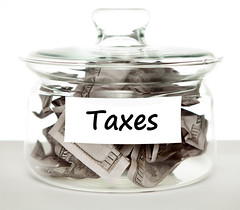Updating your status from single to married may bring about some unanticipated changes, including changes relating to your taxes. While wedding planners don’t typically use an IRS checklist, here are a few things to keep in mind when
filing your first tax return as a married couple.
As with any tax issue, contact your tax professional to help you navigate your own unique situation.
Notify the Social Security Administration (SSA)
If one of you has taken on a new name, report the change to the SSA. File Form SS-5, Application for a Social Security Card.
It is important that your name and Social Security number match on your tax return. The IRS will match your information with records provided by the SSA and, if the records don’t match, any electronically filed return will be rejected and any paper filed return will have the mismatched individual’s personal exemption cancelled until the error is corrected.
Avoid making a name change too close to tax season. While the SSA can process a name change in about two weeks, the delay in data-sharing between the SSA and the IRS can make any change near the end of the year problematic. In such situations, it may be advisable to file the tax return using your maiden name and change your name with the SSA after the return has been filed. Form SS-5 is available on the SSAs website at www.ssa. gov, by calling 800-772-1213, or by visiting a local SSA office. A copy of your marriage certificate and driver’s license is required.
Notify the IRS If You Move
The IRS will automatically update your new address upon filing your next tax return, but any notices the IRS sends in the meantime may not get to you. The U.S. Postal Service does not forward certain types of federal and certified IRS mail. IRS Form 8822, Change of Address, is the official way to update the IRS of your address change. Download Form 8822 from www.irs.gov or order it by calling 800-TAX-FORM (800-829-3676).
Notify the U.S. Postal Service
To ensure your mail, including mail from the IRS, is forwarded to your new address, you’ll need to notify the U.S. Postal Service. Submit a forwarding request online at www.usps.com or visit your local post office.
Most post offices will not forward refund checks so be sure the IRS has your correct address. Using electronic direct deposit for refunds can prevent them from being delayed due to address mix-ups.
Notify Your Employer
Report your name and/or address change to your employer(s) to make sure you receive your Form W-2, Wage and Tax Statement, after the end of the year.
Notify Financial Institutions
Financial institutions with which you do business need to be notified to ensure that any Forms 1099 are sent to the proper address. This would include banks and brokerage firms, as well as employer-sponsored retirement plans.
Check Your Withholding
If you both work, keep in mind that you and your spouse’s combined income may move you into a higher tax bracket. The IRS Withholding Calculator, available at www.irs.gov, can help you determine whether you need to give your employer(s) a new Form W-4, Employee’s Withholding Allowance Certificate. Use the results to fill out and print Form W-4 online and give it to your employer(s).
Select the Right Tax Form
Choose your individual income tax form wisely because it can help save you money. Newlywed taxpayers may find that they now have enough deductions to itemize on their tax returns, rather than taking the standard deduction. Itemized deductions must be claimed on a Form 1040, not a 1040A or 1040EZ.
Choose the Best Filing Status
Your marital status on December 31 determines whether you are considered married for that entire year for tax purposes. The law generally allows married couples to choose to file their federal income tax return either jointly or separately in any given year. Figuring the tax both ways can determine which filing status will result in the lowest tax.
For most married couples, filing jointly will result in a lower tax liability. This is especially true if there is a significant difference in your incomes. The so-called “marriage penalty” only applies to couples who both earn relatively high salaries.
Certain situations may make it more advisable for married taxpayers to file separately.
•
If both spouses have their own itemized deductions, such as medical deductions, they may be able to claim higher overall deductions because of the percentage limitations on Schedule A.
If one spouse has past due debt with the IRS or an-other government agency, such as child support obligations or student loans, filing separately will prevent the other spouse’s share of any refund from being used to offset debts for which he or she is not liable.
•
If one spouse has messy or missing records, or is thinking of taking a risky tax position, the other may want to file separately to avoid becoming liable for potential additional taxes or penalties.
Planning for your wedding may be over, but don’t forget about planning for the tax-related changes that marriage brings. More information about changing your name, address, and income tax withholding is available on www.irs.gov, or contact your tax professional.
Simple Projections
Based on your tax information from last year, it will be easy to prepare a dummy return to show what your tax situation would be if you had been married. You can print out Form 1040, other tax forms, and tax tables from www.irs.gov. On the blank forms, combine tax information from last year’s returns. For example, combine the wage amounts from both returns and enter the total on Form 1040, line 7, of the blank form. Do the same for items such as interest, other income, and include deductions if either person itemized.
Use filing status, deductions, and exemption amounts as if you had been married. The resulting tax and refund or amount due will give you an indication of whether your current withholding is sufficient to cover your tax liability when incomes are combined and will also help identify any problems that may need to be addressed when you file as married taxpayers.



















